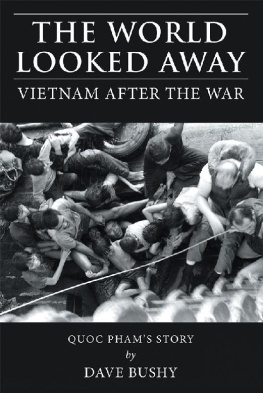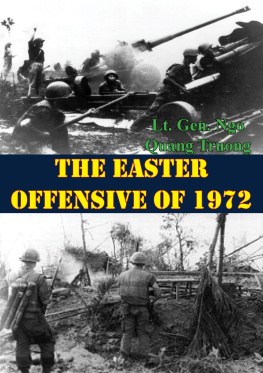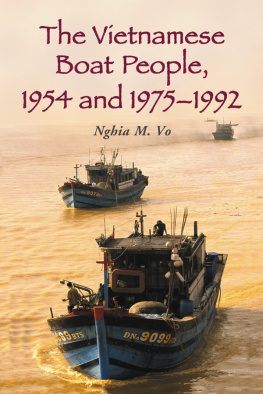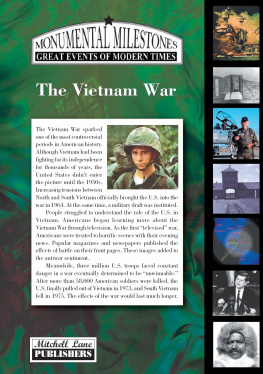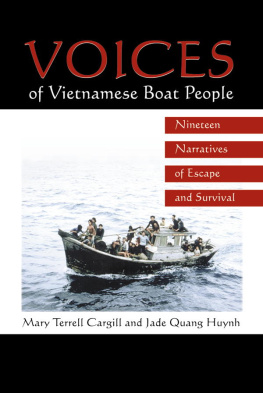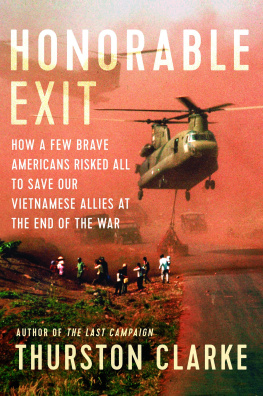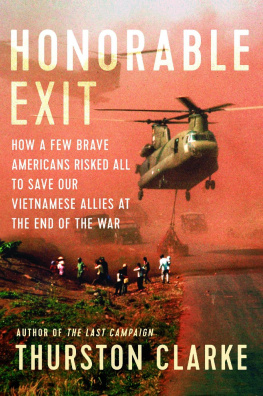QUOC PHAMS STORY
THE WORLD
LOOKED AWAY
VIETNAM AFTER THE WAR
by Dave Bushy

Copyright 2018 by Dave Bushy.
All rights reserved. No part of this book may be used or reproduced by any means, graphic, electronic, or mechanical, including photocopying, recording, taping or by any information storage retrieval system without the written permission of the author except in the case of brief quotations embodied in critical articles and reviews.
This book is a work of non-fiction. Unless otherwise noted, the author and the publisher make no explicit guarantees as to the accuracy of the information contained in this book and in some cases, names of people and places have been altered to protect their privacy.
Cover Photo: U.S.S. San Jose crewmembers in rescue of Quoc Phams boat, January 20, 1980. Records of the office of the Secretary of Defense, courtesy National Archives Research Administration.
Maps created by Hung Pham
Archway Publishing
1663 Liberty Drive
Bloomington, IN 47403
www.archwaypublishing.com
1 (888) 242-5904
Because of the dynamic nature of the Internet, any web addresses or links contained in this book may have changed since publication and may no longer be valid. The views expressed in this work are solely those of the author and do not necessarily reflect the views of the publisher, and the publisher hereby disclaims any responsibility for them.
ISBN: 978-1-4808-5236-5 (sc)
ISBN: 978-1-4808-5237-2 (hc)
ISBN: 978-1-4808-5238-9 (e)
Library of Congress Control Number: 2017917214
Archway Publishing rev. date: 01/08/2018
Publishers Cataloging-In-Publication Data
(Prepared by The Donohue Group, Inc.)
Names: Bushy, Dave.
Title: The world looked away : Vietnam after the war : Quoc Phams story / by Dave Bushy.
Other Titles: Quoc Phams story
Description: Bloomington, IN : Archway Publishing, 2017. | Includes bibliographical references and index.
Identifiers: ISBN 9781480852365 (softcover) | ISBN 9781480852372 (hardcover) | ISBN 9781480852389 (ebook)
Subjects: LCSH: Pham, Quoc Tan, 1946- | Boat peopleVietnamBiography. | Vietnam (Republic). Hai qunOfficersBiography. | Vietnam War, 1961-1975Personal narratives, Vietnamese. | VietnamHistory1975- | LCGFT: Personal narratives. | Biographies.
Classification: LCC DS559.914.P43 B87 2017 (print) | LCC DS559.914.P43 (ebook) | DDC 959.7044092dc23
TO XUONG AND VO, WHO RAISED QUOC.
TO KIM -C UONG , WHO SUSTAINED HIM.
AND TO DUONG, WHO ENCOURA GED
HIM TO TELL HIS S TORY.
CONTENTS
Throughout this work, the author has used common English for names of the individuals mentioned in the story, omitting Vietnamese spelling and accent marks. The Vietnamese language and pronunciation of names in particular is highly dependent upon accent marks. For instance, Kim-Cuong and Quoc named their son Phm Quc Hng. The last name, in English Hung is spelled the same as Kim-Cuongs fathers name, Dng Thnh Hng. The variations in accent marks create a changed pronunciation and thus a different name. This can be confusing for the non-Vietnamese reader.
Below is a list of the Vietnamese people mentioned in this story, with a brief description of who they are or the role they played. The common English spelling of their names, as used in the book, is on the left. Their full Vietnamese names, with accent marks, are included on the right. A few individuals, only mentioned once in the book, are not included in this list.
Quoc Pham | Phm Tn Quc |
Duc | Lt c (Quocs commander) |
Kim-Cuong | Dng Th Kim Cng (Quocs wife) |
Xuong | Phm Vn Xng (Quocs father) |
Vo | Hunh Th V (Quocs mother) |
Sinh | Phm Minh Hm (Quocs First brother) |
Lan | Phm Ngc Lan (Quocs Fourth sister) |
Phuc | Phm Hu Phc (Quocs Fifth brother) |
Nga | Phm Ngc Nga (Quocs Sixth sister, who died) |
Hoang | Phm Minh Hong (Quocs Seventh brother, Army NCO) |
Loc | Phm Thin Lc (Quocs Eighth brother, Air Force private) |
Cuu | Phm Trng Cu (Quocs Ninth brother) |
Toan | Ton (original team leader from Apartment Complex) |
Vong | Vng (original team from Apartment Complex) |
Minh | Minh (joined Quocs team at reporting center) |
Son | Sn (joined Quocs team at reporting center) |
Thai | Thi (spy-ring leader) |
Thach | Thch (spy) |
Hoang | Hong (suicidal prisoner) |
Quang | Quang (executed prisoner) |
Chu Tu | Ch T (District Chief) |
La Tu | La T (First boat owner) |
Y (like E) | Phm Vn Y (Quocs cousin) |
Khuong | Phm Th Khung (Quocs cousin) |
Dong | Dng Th Phng ng (Kim Cuongs sister) |
Nga | Dng Th Hng Nga (Kim Cuongs sister) |
Dung | Trn Anh Dng (Second mechanic) |
Di | Di (Second boat owner; boat used in escape) |
Lam | Lm (militia member) |
Thong | Thng (experienced sailor) |
Loi | Li (First mechanic) |
Hung | Phm Quc Hng (son) |
Kim Ngan (Amanda) | Phm Quc Kim Ngn (daughter) |
Kim Khanh (Connie) | Phm Quc Kim Khnh (daughter) |
Cuong | Phm Quc Huy Cng (son) |
Hung | Dng Thnh Hng (Quocs father in law) |
Tot | V Th Tt (Quocs mother in law) |
Ut Duc | t c (Kim-Cuongs uncle, National Liberation Front (NLF) follower) |
Muoi | Phm Th Bch Tuyt (Quocs Tenth sister) |
Hong | V Th Tuyt Hng (Kim Cuongs aunt) |
My | M (Hongs husband) |
Hong Ngoc | Nguyn M Hng Ngc (Hongs daughter) |
Hoang | Hong (Hong Ngocs brother) |
Thieu | Nguyn Vn Thiu (S. Vietnams Second President) |
Huong | Trn Vn Hng (S. Vietnams Third President) |
Minh (Or Big Minh) | Dng Vn Minh (S. Vietnams last President) |
Duong Nguyen | Nguyn Th Thu Dng (Quocs Second Wife) |
This is the true story of Quoc Pham, a South Vietnamese Navy officer, and Kim-Cuong, the woman who loved him. It is about the enduring strength of family and the human spirit. The story is set against the backdrop of a victor whose leaders chose brutality and economic punishment towards a people who had taken up arms against them.
After the Geneva Accords in 1954, South Vietnam had been established as an independent nation, divided from North Vietnam by the 17 th Parallel. In the following five years, South Vietnam had been relatively prosperous and had known peace. Then in late 1959 the conflict began anew, as the North began its efforts to take over the South and create one combined nation. Though it was always seen on the world stage as a fight by a free country against a Communist aggressor, to Quoc and his fellow countrymen it was simply a fight against invasion. Ideological dogma was less a part of their thinking than was patriotism. As patriots, their belief was that they fought to keep their country free and independent.
Next page
